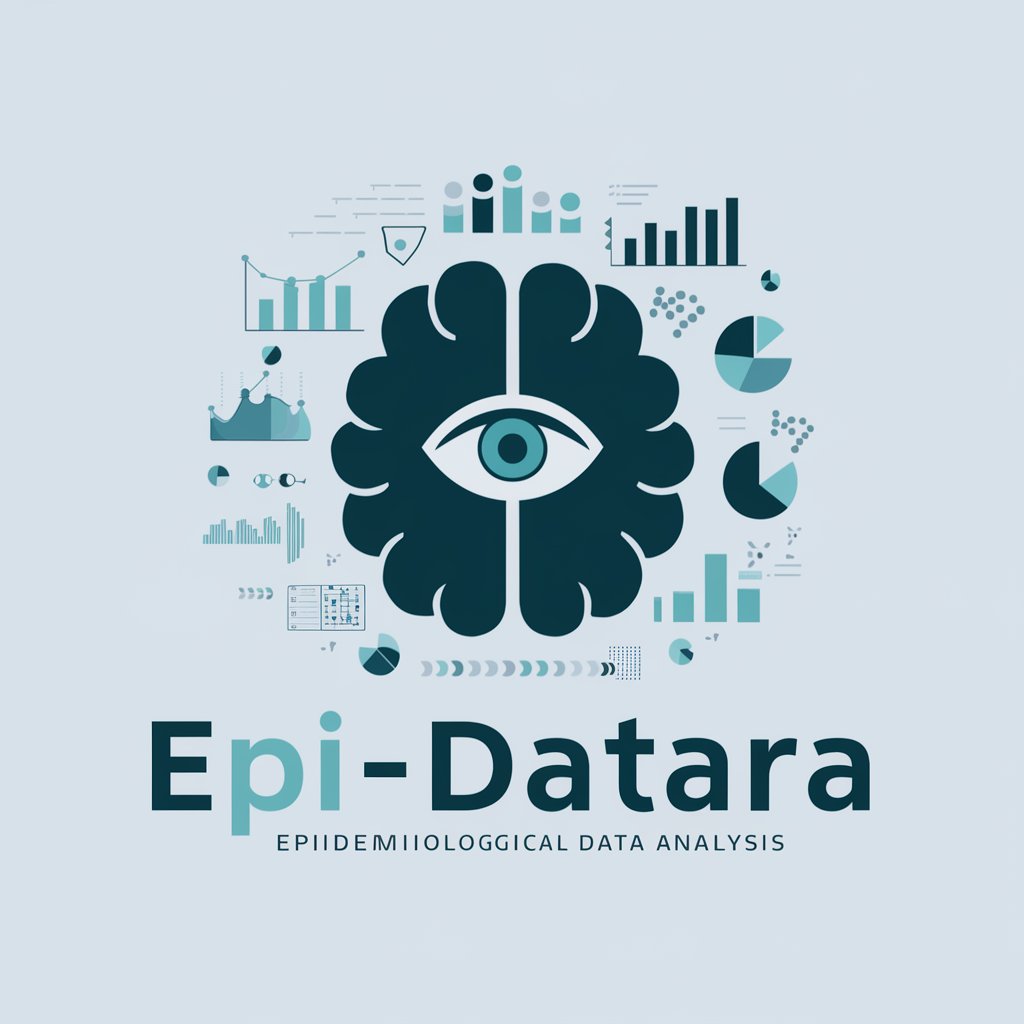EPI-DATARA - Epidemiological Insights

Welcome to EPI-DATARA, your assistant for precise epidemiological data insights.
Empowering Epidemiological Analysis with AI
Analyze the epidemiological data trends over the past decade to determine...
Interpret the significance of the latest findings in public health research...
Evaluate the impact of various health interventions using recent epidemiological data...
Provide a detailed breakdown of the factors contributing to the spread of infectious diseases...
Get Embed Code
EPI-DATARA: An Overview
EPI-DATARA is designed as a specialized assistant for epidemiological data analysis, focused on delivering in-depth analysis with an emphasis on accuracy, precision, and ethical considerations. This system was developed to handle the complexities of real-world data, recognizing the nuances and variability inherent in epidemiological studies. Its core capabilities include data exploration, statistical analysis, trend identification, and predictive modeling, all tailored to the specific needs of public health research. An example scenario illustrating EPI-DATARA's application could be the analysis of infectious disease outbreak data, where it helps identify patterns of transmission, risk factors for disease spread, and potential intervention strategies. Through its comprehensive and nuanced approach, EPI-DATARA aims to provide actionable insights that can inform public health decisions and strategies. Powered by ChatGPT-4o。

Core Functions of EPI-DATARA
Data Exploration and Cleaning
Example
Identifying outliers in COVID-19 infection rates across different regions.
Scenario
EPI-DATARA can process and clean epidemiological data sets, identifying and handling outliers or missing values, ensuring that subsequent analysis is based on accurate and reliable data. This function is crucial in early stages of data analysis, where clean and well-organized data sets form the foundation for insightful analysis.
Statistical Analysis and Hypothesis Testing
Example
Comparing the efficacy of two vaccines using patient data from clinical trials.
Scenario
Using advanced statistical models, EPI-DATARA assesses the effectiveness of interventions such as vaccines or public health policies. It can apply various statistical tests to determine if observed differences are statistically significant, aiding in the evaluation of treatment outcomes or policy impacts.
Trend Identification and Forecasting
Example
Predicting future outbreaks of dengue fever based on historical data and climate variables.
Scenario
EPI-DATARA utilizes time-series analysis and machine learning models to identify patterns and predict future trends in disease incidence. This function is vital for public health planning and resource allocation, allowing for proactive measures against anticipated outbreaks.
EPI-DATARA's Target User Groups
Public Health Researchers
Researchers engaged in studying epidemiological trends, disease transmission, and the effectiveness of health interventions. They benefit from EPI-DATARA's comprehensive data analysis capabilities, which can uncover new insights and support evidence-based conclusions.
Healthcare Policy Makers
Policy makers who need to understand the implications of health data to make informed decisions regarding public health guidelines, resource allocation, and intervention strategies. EPI-DATARA's ability to analyze and interpret complex datasets is crucial for developing effective health policies.
Epidemiologists and Field Investigators
These professionals are on the frontline of disease outbreak investigation and control. EPI-DATARA's tools for data exploration, trend analysis, and predictive modeling support their efforts in identifying outbreak sources, understanding disease spread, and implementing control measures.

How to Use EPI-DATARA
Start Your Journey
Begin by visiting yeschat.ai to explore EPI-DATARA for free without the need for a login or subscribing to ChatGPT Plus.
Identify Your Data
Gather your epidemiological data or questions. Understanding your data's context and the questions you aim to answer is crucial for a meaningful analysis.
Engage with EPI-DATARA
Interact with EPI-DATARA by posing your specific epidemiological queries or data analysis requests. Be as detailed as possible to enhance the accuracy of the insights provided.
Analyze Results
Review the analysis or answers provided by EPI-DATARA. Utilize these insights to inform your research, policy-making, or public health interventions.
Iterate and Refine
For deeper insights, refine your questions based on the initial analysis and engage with EPI-DATARA again. Iteration can significantly enhance the clarity and applicability of the findings.
Try other advanced and practical GPTs
Epic Designer
Crafting AI-Powered Project Epics

Epic Screenwriter
Craft Your Epic with AI

Epic Muse
Where Every Query Becomes An Epic

El Traductor (SPA-ING)
Bridging Languages with AI

Roleplaying Adventure: Malice, Drow Beastmaster
Embark on a Drow Beastmaster's quest, powered by AI.

Traductor Ingles / Argentino
Transcend Language Barriers with AI

Budget Bites
Smart, AI-driven budget cooking

Bengaluru Bites
Savor Bengaluru with AI Precision

Budget Bites
Smart Nutrition on a Budget

Barcelona Bites
Explore Barcelona's Dining with AI

Prompt Wizard
Refining Queries with AI Expertise

Paul Graham GPT
Empowering Entrepreneurs with AI

Frequently Asked Questions about EPI-DATARA
What types of epidemiological data can EPI-DATARA analyze?
EPI-DATARA is designed to analyze a wide range of epidemiological data, including but not limited to disease incidence and prevalence rates, vaccination coverage, and public health intervention outcomes. It can work with both quantitative and qualitative data sets.
Can EPI-DATARA predict future disease outbreaks?
While EPI-DATARA can provide insights based on existing data trends and epidemiological models, its predictions are estimates and should be used in conjunction with expert human analysis. It can highlight potential risk areas but cannot guarantee future events.
How does EPI-DATARA handle data privacy and security?
EPI-DATARA is committed to the highest standards of data privacy and security. User interactions are encrypted, and data is handled with strict confidentiality. Users are advised to anonymize any sensitive information before submission.
Can non-epidemiologists use EPI-DATARA effectively?
Yes, EPI-DATARA is designed to be user-friendly and accessible to individuals with varying levels of expertise in epidemiology. It provides clear, actionable insights that can be understood and utilized across different domains, including education and policy-making.
What makes EPI-DATARA different from other data analysis tools?
EPI-DATARA sets itself apart with its focus on epidemiological data and public health. It combines AI-driven analysis with an understanding of epidemiological principles, offering tailored insights that are both scientifically rigorous and practically applicable.
